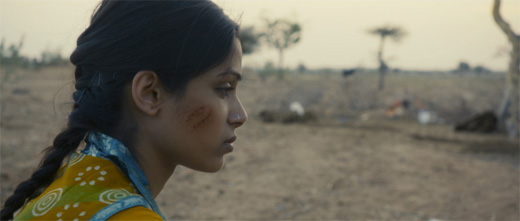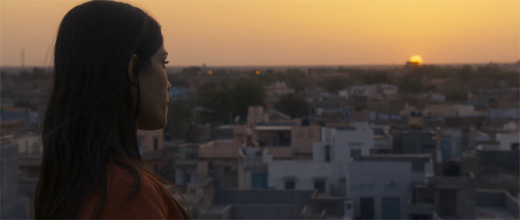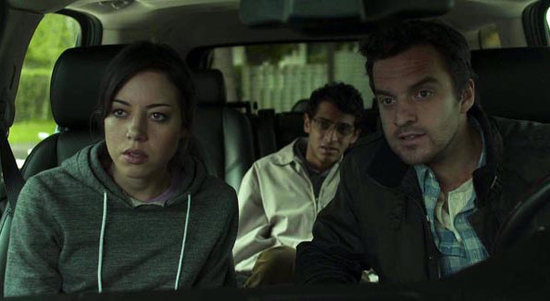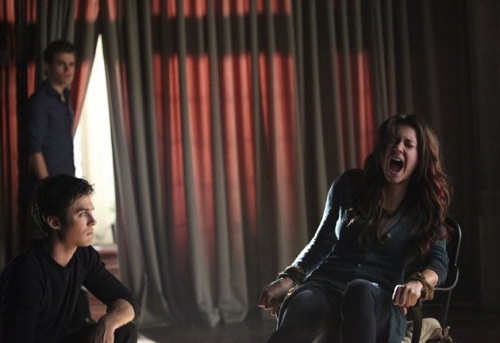 Trishna
Trishna
Written and directed by Michael Winterbottom
UK, 2011
Among contemporary cinema’s more versatile and prolific directors, one of the few sources of inspiration Michael Winterbottom has repeatedly returned to is the work of Thomas Hardy. Jude, his 1996 adaptation of Hardy’s Jude the Obscure, was effectively his breakthrough film; 2000’s The Claim, meanwhile, was loosely based on The Mayor of Casterbridge, applying content from that novel’s Victorian England setting to an American western. Winterbottom’s latest Hardy adaptation, Trishna, has more in common with that latter film in that it transfers the source material of Tess of the d’Urbervilles to a different setting and culture. Set in India, Trishna differs from both of the director’s previous Hardy adaptations in that it tries to apply the source’s themes and narrative to the contemporary version of its setting. The result is not very successful.
While it would seem difficult to make the novel work in a contemporary Western context, it is, in theory, a fairly credible idea to set it in India, where a great gulf between the rich and poor and exploitation of the latter is still prominent, especially in the current economic times. Adapted for film and television numerous times, most notably by Roman Polanski with Nastassja Kinski in the eponymous role, Hardy’s story concerns a young peasant girl becoming an object of affection for two men, one of whom leads her life down a particularly tragic path. Winterbottom’s own screenplay streamlines and restructures the novel so that it now only involves the one man, becoming the story of the relationship between Trishna (Freida Pinto), the daughter of an auto rickshaw owner, and Jay (Riz Ahmed), a wealthy young British man who has come to India to work in his father’s hotel business. Circumstance and love bring them together, but Trishna is the one who suffers as social, cultural traditions and the increasing ambivalence and sadism of Jay become apparent.
Trishna is a film that is unusually passionless despite obvious intentions for it to be a work of confused, chaotic passions. Winterbottom’s loose style with the content would perhaps be more forgivable if Pinto and Ahmed were not so stilted in their roles. Supposedly having allowed for misguided improvised dialogue, the translation of the story, in a paradoxical fashion, feels simultaneously too loose and yet too weighty for the actors to handle. Ahmed has a challenge in having to encompass two different characters into a single turn, and the transition between the two is not handled gracefully. The Jay of the first half feels like he has some basis in genuine emotion; the second half has the novel’s unpleasant Alec d’Urberville side take over, but the justification for the dramatic personality switch feels extremely feeble. The awkward performance that results makes it very difficult to see Jay as a believable character. Pinto’s problems also relate to her characterisation, and her meek performance at least feels consistent with that. Her constant passivity makes her a frustrating and uninteresting character to follow, however; one section of the film in which she is abandoned by Jay in Mumbai is particularly representative of the tedium provoked by much of the film.
Trishna’s characters seem to exist completely on the surface, though the film’s aesthetic surface is admittedly its lone saving grace. Marcel Zyskind’s fine cinematography exploits the vibrancy of the Indian locations in regards to colour, detail and immersive energy, providing a solid foundation for the settings that pleasingly don’t rely on heavy-handed tourist imagery; the one detriment is that it doesn’t have a convincing bond with the characters. Shigeru Umebayashi’s score is also a positive; his work combined with Zyskind’s provides some semblance of evocativeness amidst a work that is otherwise lacking in it thanks to its insipid subjects of focus.
Josh Slater-Williams







